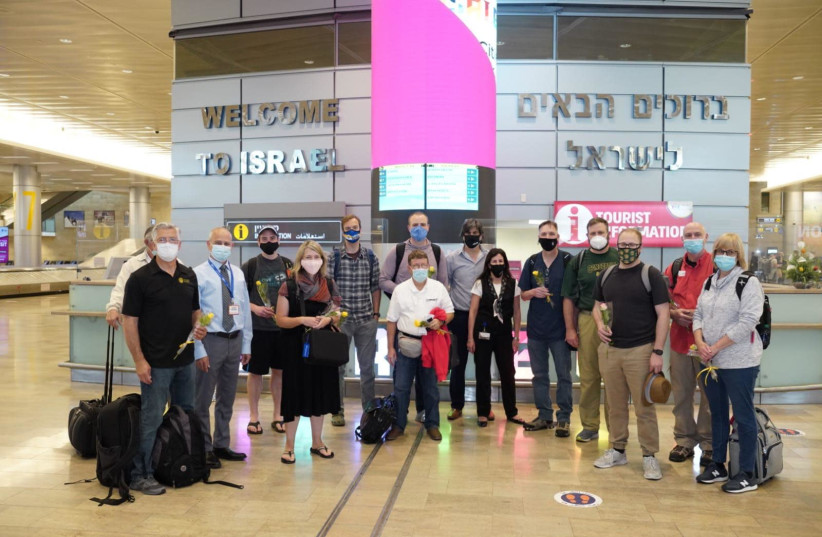Israel’s borders have been closed to tourists for the last two years since the onset of the COVID pandemic and only this month opened up to welcome both vaccinated and unvaccinated travelers.
While Evangelical Christians comprise a good bulk of Israel's tourists, only 7% of American Evangelical Protestants have ever visited the Holy Land, according to a 22-page report released in early March.
So, given today’s open skies, how ready are Evangelicals to hop a plane to Israel and, when they do, what is their preferred way to travel?

A recent study – The Holy Land Journey: Evangelicals and Israel Travel – conducted by Infinity Concepts and Grey Matter Research, sought to answer those specific questions.
In a survey which included more than 1,000 American Evangelical Protestants – based on the National Association of Evangelicals’ definition – eight out of 10 Evangelicals are interested in traveling to Israel (80%). Roughly half of that group (40%) say they are not just interested, but extremely interested in a visit to the Holy Land, especially if they had made a visit to Israel before. More than half (52%) of the respondents who previously visited Israel are extremely interested to return, and another 43% of prior visitors are moderately interested in a repeat trip.
Those respondents most interested in returning to Israel are more engaged in their faith; i.e., read the Bible at least once a week, attend church at least once a month, and/or are part of a small group. They also tend to believe that Jews continue to be God’s chosen people today.
Age and wealth played a factor in the responses, with younger, higher-income Evangelicals more likely to be extremely interested in making a trip to Israel soon.
According to the study, roughly 50% of Evangelicals involved in the faith say they would consider traveling to Israel with a well-known Christian leader or Bible teacher, while 49% said they would want to go on a group tour with their own pastor and/or members of their church. Four out of 10 Evangelicals say they would travel independently and 39% said they would consider a trip led by a professional tour guide. Less than one-third of respondents (31%) said they would take a trip led by a historian, a community leader or someone they know (28%).
Potential Evangelical tourists differ over how safe they believe it is to visit the Holy Land now that travel is more readily accessible. Approximately 27% of American Evangelicals surveyed believe Israel is generally unsafe, with a remarkable 33% undecided. The remaining 40% believe travel to Israel is safe, with a mere 18% believing it would be extremely safe.
Among those respondents who have already visited Israel at least once, 68% believe it is safe with 28% stating it is extremely safe, while only 8% of that group view Israel as generally unsafe.
Ron Sellers, president of Grey Matter Research, warned that Evangelicals may choose, in fact, not to visit Israel now due to safety concerns.
“Israel’s tourism sector could benefit from a renewed public relations effort to help people better understand the safety of travel to Israel, especially in tourist areas,” the report concluded. “Israel must face the challenge of rebuilding its tourism infrastructure in the coming years. This is an opportunity to grow economically and help people fulfill their desires to visit the Bible lands.”

“Those who have already visited Israel are more than seven times more likely to see it as safe rather than unsafe, 68% to 8%,” Infinity Concepts founder and President Mark Dreistadt stated. “This enormous gap suggests a change in perceptions of safety among those who have never been there could go a long way toward increasing Israel tourism.”
Dreistadt further noted that the strong desire to return is one of the best endorsements of travel to Israel.
“With so many fascinating destinations available to travelers post-pandemic, the fact that nine out of 10 evangelical visitors would like to return to Israel, the land of the Bible, says a lot about the experience they had in the country,” he said.
<br><strong>SOME TRAVEL COMPANIES AHEAD OF THE CURVE</strong>
It would seem at least two Israeli Christian tour companies are on the right track with recent initiatives to educate tour leaders and prepare visitors for their journey to the Holy Land, both from a safety perspective and also teaching them the "lay of the Land."
Last year, Keshet Educational Journeys launched Israel Tour Leader, an online study platform to help bridge the gap in physical tourism by creating an extensive library of lectures, 360-degree virtual tours of biblical sites and relevant teaching of ancient and modern Israel. The course is designed to help anyone who wants to lead tours to Israel – such as pastors and ministry directors from overseas – to gain supplemental knowledge and relevant spiritual messages to share with their groups for various sites while on a tour in Israel.
Marnix Van Ede, director of partnerships at Keshet Journeys, told ALL ISRAEL NEWS that his company created the course because there are not enough licensed Israeli tour guides who are believers and also speak the native language of the country the group is traveling from.
“We have great tour guides in Israel, but there are not enough Messianic or Christian guides,” he explained.
“Hearing the right spiritual message at the right location is the most crucial element of a tour to the Holy Land,” Keshet Director Moshe Gabay added. “If we can help to improve this for any group touring the land, we can facilitate peoples’ lives being changed. This is the reason we created this course.”
Gabay also stressed that while the course provides realistic, virtual access to Israel’s sites and a wealth of information, nothing can replace the life-changing experience of an actual tour in the land.
Sar-El Tours has been leading faith pilgrimages and guiding Christian groups to Israel for 27 years, offering a wide variety of biblical, historical and prophetic tour options. The company’s recent initiative, Sar-El Academy was launched during the COVID pandemic to address a demand for virtual tours because of lockdowns and closed borders.
The academy is a premium biblical education program available online in 14 different languages to help those who might be leading a group to Israel, including pastors, to prepare ahead of time.
Viewers can watch episodes of top destinations across the country, to see the sites and learn the historical and geographical background of each location, along with their biblical references. And it’s all free.
